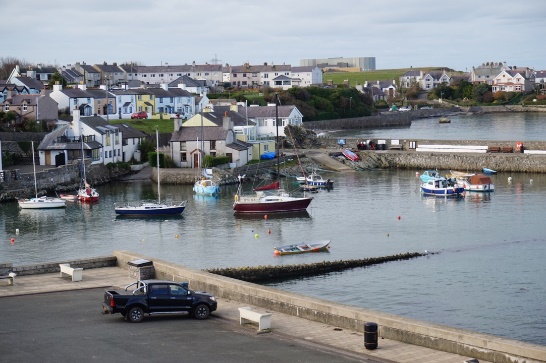Hitachi freezes nuclear plant export project to the UK
On January 17, 2019, Hitachi, Ltd. decided at an extraordinary board of directors meeting to freeze the nuclear power plant construction project it had been promoting in the United Kingdom. Hitachi’s wholly-owned subsidiary, Horizon Nuclear Power Co., planned to build two nuclear power generating units on the Isle of Anglesey in northern Wales.
For a long time, Hitachi, Ltd. had stated there were three conditions to continue the project: (1) acquisition of necessary licenses and approvals, (2) securing of profitability, and (3) lowering Hitachi’s the investment ratio in the project and removing it from the consolidated financial results of the Hitachi parent company. The company eventually decided on the freeze because these conditions were not met.
Meilyr Tomos, a member of “People Against Wylfa B” (PAWB),1 a community group from Wales, came to Japan in May 2018. She had this to say: “We do not want to leave a burden for our children That’s why we have continued our opposition. We welcome the freeze of the project.” Robat Idris, also with the delegation, said: “I think nuclear power is an outdated technology. The economics are a problem, but this project also has problems in terms of Welsh culture, the natural environment, radioactive waste, and so on. We welcome the freeze.”
Project cost 3 trillion yen: Attempt to shift risks onto Japanese and UK citizens!
For Hitachi’s planned nuclear plant export, one big problem was who was going to cover the huge cost of 3 trillion yen in project costs. Initially, it was reported that the UK and Japanese government agencies would directly invest in the project and provide government-backed loans. “The common understanding is that if the two governments do not have the commitment, the business cannot proceed,” said Hiroaki Nakanishi of Hitachi, Ltd. (current chairman of Keidanren, the Japan Business Federation). The concept was to shift the risks that could not be covered by one private enterprise alone to the Japanese and British citizens.
In addition, to ensure the profitability of the project, Hitachi, Ltd. asked the UK side to pay an expensive rate for the electricity that would be produced. Electricity market prices remain around 40 to 50 pounds per MWh. Meanwhile, the electricity rates from another nuclear power plant currently under construction in the UK are 92.5 pounds/MWh. Seeing the nuclear rates at about twice the market rate for other electricity, UK citizens voiced their criticism loudly.
Hitachi would have to charge exorbitant electricity rates in order to make the project profitable. But higher rates would simply increase the burden on UK electricity consumers. The UK government, meanwhile, stated that it could not pay rates more than 75 pounds per megawatt- hour.
Hitachi said that it is “freezing” the project, but has not made a complete withdrawal. However, based on the above conditions, it will be very difficult in reality to revive the project.
What about impacts on the Isle of Anglesey?
Anglesey is an island with a population of 70,000, its main sources of income being tourism and agriculture. These would be the industries most affected if a nuclear accident occurs. Only two bridges connect Anglesey to the main island, so morning rush hour traffic is heavy. In the event of a nuclear accident, residents would face challenges in evacuating from the island. There are many environmental and landscape-protected areas on the island. The European tern, requiring protection under EU law, has habitat near the nuclear plant site.

Robat Idris of PAWB said, “If the decision is made based on economics alone, there might end up being a return to nuclear if it becomes cheaper than other energy. We will continue to talk about the problems with nuclear power besides economics. Also, we want to continue spreading information and having dialogue about a local economy that does not rely on a nuclear plant.”
Japan’s nuclear plant exports: A growing list of collapsed deals
Internationally, with the rapid growth of renewable energy, many countries are withdrawing from nuclear power. Going in the opposite direction, Japan has been promoting nuclear exports as a national policy, even after the nuclear accident in 2011. In response to the 2005 Framework for Nuclear Energy Policy under the (former) Koizumi Cabinet, a plan for national prosperity relying on nuclear energy was formulated the following year, featuring the Japanese nuclear industry. Until then the industry had been mainly domestic, but now it was seen as playing a leading role in promoting nuclear power in the international market. A big effort was then made to sell to countries like India and Vietnam, etc.2 After years of negotiations, a nuclear agreement was signed with India in 2016, and it entered into force in 2017 after a parliamentary debate.
However, Japan’s concerted efforts for nuclear exports, reliant on generous helpings of public tax money, have ended in a series of failures due to ballooning costs and public opposition in other countries. Nuclear power has been clearly exposed as a risky business. What Japan should really be exporting is systems for sustainable society, lessons learned from the Fukushima nuclear accident, and ways to exit from the mass consumption of energy.
- PAWB has opposed the nuclear plant since the plan first arose on the island of Anglesey in the 1980s. It has conducted anti-nuclear activities including information dissemination and demos, and has also worked to promote a local economy that does not depend on nuclear power.
- Yoichi Nakano, Sekai no genpatsu sangyo to Nihon no genpatsu yushutsu (The global nuclear industry and Japanese nuclear exports), 2015.
